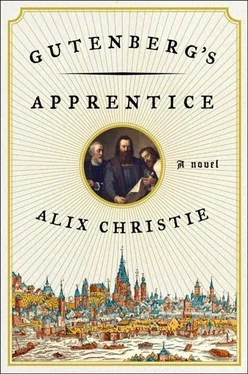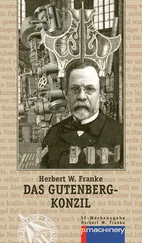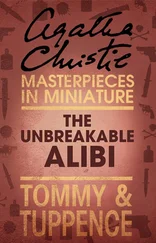“Eight hundred guilders are not nothing.”
Peter struggled to control his shock. Eight hundred guilders! Holy Christ. The sum was staggering, enormous even for a man of Fust’s ambitions. Enough to buy eight houses or several farms. He felt the blood drain from his face.
“I don’t have time to waste in holding hands.”
“Those hands are worth more than you think.”
Peter watched those two face off across the battered table, moving not a muscle as they tossed his life between them. He should have stood and walked away. But he could not; his duty bound him hand and foot.
“You’ve not advanced the whole.” The printer’s voice was querulous. “I need the rest for metal and equipment.”
“You’ll get it when the contract’s drawn, as soon as I can raise it all myself.” For all his wealth, Fust didn’t have that kind of ready gold. He financed major outlays from the Lombard or some Jews in Frankfurt. “In counterpart,” his father said, “you’ll train my son, and pledge the instruments you make as guarantee.”
“I don’t impart my knowledge on the cheap.”
“It is my wish that Peter learn this art.”
Gutenberg looked sharply at Peter, then returned his deep-set gaze to Fust. “I already said the whole thing’s much too tight.”
“The Latin grammar will sell well. And once we’ve picked the book to print you’ll find and charge apprentices, as many as you please.”
The silence hung like something breathing in the room. It pressed against the cobwebbed rafters, slithered down the blank gray walls. Peter stifled a cry for his old life — for feathers flashing, all the whirling on the place de la Sorbonne. Was this why God had raised him up? So He could fling him back into the muck from whence he’d come? He clenched his fists to stop the pricking in his eyes.
“One thing.” Gutenberg had risen. “If there must be a contract, I will have your pledge.” His eyes bored into each in turn. “Everything I teach remains within these walls.” He scowled and threw his sharp, impatient gaze about the room; when he reached out and seized a crucifix that hung above a desk, they understood. Peter laid his hands on it and swore to tell no man the art and manner of the work; he pledged his honor in the eyes of God.
It felt exactly as if he’d been inducted, blindfolded, into some black and cabbalistic brotherhood.
September — October 1450
THUS BEGAN his apprenticeship.
The day he started, he rose before dawn. His feet propelled him out and up and down the silent lanes of Mainz, shrunk now to just six thousand souls — less of a proud free city than a crumbling town.
When he’d first come here, Mainz glittered. Peter still remembered how the dukes of Katzenelnbogen raced their sledges, banners flying, through the icy streets around the market square. Golden Mainz, they used to call her, a city with more gold- and silversmiths than any other in the empire. But then the workers dared to claim a piece of all that wealth, and the ruling class cried foul.
More than once, and over many generations, the guildsmen had risen up in desperation, but were always beaten back. This time they’d won the council fair and square, and so the punishment exceeded all the times before. Most of the Elder clans had withdrawn to their country homes, his father said, incensed at being told to pay their share of taxes. The work fled with them, starving all the local craftsmen — but this was not the worst, to Fust. Archbishop Dietrich’s ban also throttled the river trade, cutting off the long-distance merchants. Mainz was besieged not from without but from within; she was a stunted place, sealed from the world.
A candle flickered lonely in the sacristy of the cathedral as Peter passed. The ban had muzzled all St. Martin’s bells and chained its iron grille. The market square was darkened at its edges by prone bodies that he took at first for rags. Along the lane before the house of the Franciscans, he was forced to pull his cloak up to his nose. The wine the friars poured just puddled afterward as vomit spewed by idle workers seeking comfort in their courtyard. Peter turned his feet away and sought the ramparts, yearning for fresh air. Each of the city’s gates — the Iron, Wood, and Fish, the others doubtless too — was posted with a man from the archbishop’s guard. They eyed him coldly as he hurried past. The little stair was crumbling; the wall was in sore need of repair. Once there had been a dozen constables patrolling in rotation, shoring up the city’s main defense.
A streak of yellow like ripe flax began to tip the eastern hills. He stood chest-high against the battlement, surveyed the river and the farther bank, the faint trace of the road that led to Frankfurt. A snail’s track from this distance, it was deadly nonetheless: infested with the desperate and thieving, men who did not pause to ask your name before they emptied out your innards. Even when they could set out, the merchants moved in guarded convoys. They’d heard about, or seen themselves, the Dutchman who’d refused to pay, whose hands and head were staked out at the junction, one leg set toward Trier, the other one toward Worms.
Behind Peter to the west were roads that led to Luxembourg and Burgundy and France — but these too were now barred. The whole archdiocese was shut to any man of Mainz until the city scraped up the interest for the Elders and their bankers. The facts of the dispute were plain and brutal. For centuries the ruling class had run the city like their private bank. They’d lent the council sums they then repaid themselves at crushing rates of interest. These bonds they then bequeathed to their own spawn, in perpetuity. Thus was the city fated to insolvency, like half of the free cities in the Reich. Each time the treasury was bare, Archbishop Dietrich would step in, prop up that rotting edifice, enact some other tax that only workingmen and merchants had to bear. But not this time — the riffraff claimed to rule. So cry away, the Elders sneered; there’s no one else to blame. The council was to pay the debt, or else dissolve. Dietrich proposed to pay the loans if Mainz would hand him back the reins. His message was plain: stay in your place.
A wedge of starlings flashed above the muddy bank below, empty now of ships that once had jostled in a floating herd. How hollow the world seemed without the hoarse cries of the boatmen and the creaking of the cranes. A solitary man picked his slow way along the shore, and Peter pictured the lone figures stealing in at night, those priests that Grede had told him of from distant parishes who’d bless an infant, say a hurried prayer, or even ferry off a corpse for Christian burial for those few families with sufficient gold. The devil take the archbishop, Peter thought fiercely. Every citizen of Mainz was trapped, including him. He turned and started down.
How he had scoffed at them — his father and his uncle, with their impotence and fury. His uncle, Jakob, most of all: the Brudermeister of the goldsmiths’ guild, who in Peter’s absence had been voted to the city council. How could a man waste his whole life in futile stewing? Better to carve out a life of the mind far from this dried-up husk. Fury rose and strangled Peter anew, to find himself once more a hostage to their endless wrangling.
The feud in Mainz was ancient, and perhaps eternal: between the man who makes things— homo faber —and the man who trades what others make to his advantage. Mankind was greedy, grasping, Peter thought: it went straight back to Cain and Abel. In the archdiocese of Mainz, this conflict had destroyed the peace for all their lives. That first day the old smith thrust an apron and a glove at him, both stiff as armor plate. “I made the fire. You’ll make it from now on.” Hans Dünne looked skeptically at Peter’s slender wrists. “Let’s hope to God you can.”
Читать дальше












